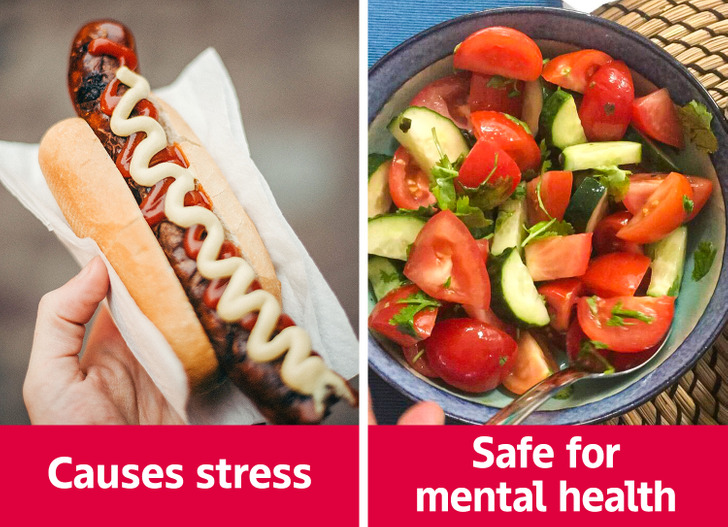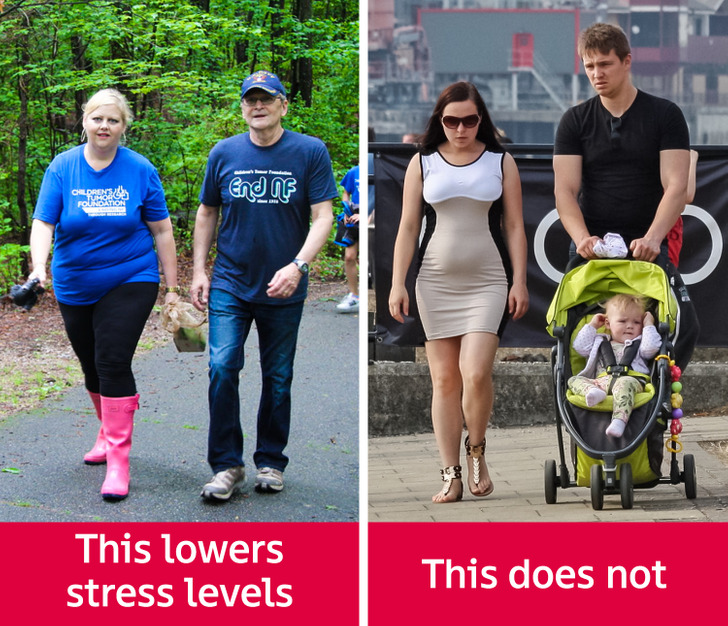12 Ways to Protect Your Mental Health so Nothing Can Break You
No matter how hard we try to stay calm, stress is a daily occurrence. Anything can become a trigger and cause anxiety — a remark from a colleague, difficulties at work, the weather, news, or a relationship. We’ve found some effective tips to make sure that no annoyance can ruin your day or your mood. These tips prove that psychologists and scientists may know what they’re talking about after all, as their advice can dramatically change the way we approach taking care of our mental health.
1. Listen to music
A study showed that people who listen to music are less likely to suffer from anxiety. Music can also act as a painkiller. Tests conducted on 7,000 patients confirmed that they needed less medication after listening to music.
But the healing power of music doesn’t stop there. Scientists have proven that it has a positive effect on mood disorders associated with neurological conditions, including Parkinson’s, dementia, stroke, and multiple sclerosis. Listening to your favorite songs is an effective way to prevent depression and anxiety.
2. Keep a diary
According to experts, a diary is a savior of mental health. To make it a regular habit, you have to start in the right way. Psychologists recommend writing at least five minutes a day, recording all your emotions and impressions of the day. Pay attention to the following points:
- Be specific about your goals, why you are going for them, and what you need to do to achieve them. Keeping everything in your head makes for an abstract picture, so make it clear on paper and you’ll breathe a sigh of relief.
- Praise yourself for the work you’ve done. We underestimate ourselves much too often. Be happy even about the smallest of accomplishments, like buying groceries or sorting out the mail.
- Write a letter to someone who has hurt you as if they’re going to read it, or better yet, imagine them standing in front of you. This is a useful practice, as negative emotions can build up in the mind, and prevent us from understanding the situation. On paper, you will clearly state what has upset you. Re-reading the letter will allow you to work through the resentment and move on.
- Write a thank-you letter to a friend or yourself. Express in detail how your life has improved, or what character traits are particularly great. Describe instances when it seemed like all was lost, but you managed to get through it.
3. Don’t neglect exercise
Scientists have previously found that walking for 30 minutes five times a week reduces the risk of depression. Physical activity is good for the psyche and reduces the effects of stress. Choose an activity that suits you best; it can be dancing, weightlifting, simple exercises at home, or yoga. You don’t need to lift weights at the gym every day to improve your mental well-being. Research has shown that working out just a couple of times a week is a great way of preventing depression.
4. Use power poses
There is a way to instantly feel more confident and relaxed. To overcome feelings of anxiety and tension, experts advise striking a power pose, for example, putting your hands on your hips. Assuming a more open stance and occupying more space has been shown to boost testosterone levels and lower levels of cortisol, the stress hormone.
The right pose enhances confidence and makes you feel more empowered. Closed poses, however, work just as well in achieving the opposite. Remember this advice before an important speech or presentation when you need to feel more confident and powerful.
5. Minimise your consumption of ultra-processed foods
To avoid depression and anxiety, experts recommend reviewing your diet. Lovers of sugary sodas, cookies, and hot dogs put their mental health at risk more than others. Also, be careful with processed meat products and canned foods. Ultra-processed foods have almost no nutritional components. Instead, we get an “empty” product with a lot of sugar and spices, which has a negative effect on the body as a whole. Gradually, start introducing whole foods into your diet, such as fruit or vegetables for a snack.
6. Go for walks in the woods or at least look at photos of nature
Even just a half-hour walk every day will improve mental well-being, but the location is just as important. A study showed that an hour’s walk in nature reduced the activity of the amygdala, the part of the brain responsible for processing stress and fear. Sixty-three people were studied, some went for walks in the city, and others, in nature. The former had no decrease in the activity of the amygdala, while the latter displayed the opposite; indicating that nature is beneficial for relaxing our brains from urban stress. So, a walk in the park among the trees will reduce stress levels, but a walk in the city will not.
Experts also recommend looking at pictures of the forest and nature more often. This has a relaxing effect on the psyche, similar to a walk in the woods.
7. Try not to eat at night, even if you work the night shift
Night shifts, in general, are not easy on the body. Wakefulness, combined with stress and night-time snacking, is a real challenge to mental health. Research has shown that night shifts increase the risk of obesity and type 2 diabetes, and cause symptoms of depression and anxiety. People who ate during the day as well as at night were found to have increased levels of depression and anxiety. In contrast, people who ate only during daylight hours did not show such significant changes. Experts define a daylight period of 8-12 hours as the optimum time to eat.
8. Play word games
If you like doing crossword puzzles, solving riddles, or guessing words from letter clues on a phone app, your brain is protected. Researchers have found that puzzles stimulate key parts of the brain responsible for reasoning, language, logic, vision, attention, and flexibility. This is an excellent prevention of cognitive decline as we age.
Experts recommend training and challenging the brain with logic puzzles because each new, unfamiliar task creates new neural connections and makes a reserve for the future.
9. Detox from social media
We often hear about the negative effects of social media. The emotional swings from reading news headlines and opinion-sharing can drain you of all your energy. Actor Tom Holland decided to quit social media for a while, explaining his decision, “I find Instagram and Twitter to be overstimulating, to be overwhelming. So, I decided to take a step back and delete the app.”
Researchers also recommend taking a break. A week off from social media will improve mental health, and relieve anxiety and symptoms of depression. But it’s best to introduce these breaks gradually, and not be too hard on yourself for any “relapses”, to avoid additional stress. A safe “dose” of social networking can be determined by taking note of how you feel and what you need.
10. Don’t forget to take breaks at work and value your efforts
Don’t get angry if a colleague or partner occasionally distracts you from your work. Psychologists say that 5-minute breaks are very useful to avoid burnout and overexertion.
Psychologists also recommend regularly asking yourself, “What positive impact does my work have on people?” Spend some time thinking about it and write down the answer. When you start to feel like your work routine is bringing you down and you hate what you do, read this note. It will remind you of the importance of your work and reduce your stress levels.
11. Focus your energy only on what you are able to control
Neuropsychologists affirm that negative thoughts create negative emotions. Therefore, they suggest focusing only on what you can control by asking yourself three questions: “What is bothering me?”, “Is it in my power to control it?” and “What is most important to me and what can I do about it?” It’s important to accept that some things are beyond our control, and some things are only in your mind.
So don’t waste your energy complaining about the weather or worrying about a job interview. Try to channel your energy into constructive activities. Think about which risks are making you nervous. For example, replace the anxiety ahead of an interview with research about the recruiting company, or rehearse your speech in front of a mirror.
12. Practice cinema therapy
We may think that watching films is just entertainment, but psychologists have found that movies can be very beneficial for mental health, as well as stress management. For example, laughing heartily at a comedy will lower the levels of adrenaline and cortisol — the stress hormones in your body. If you’re not in the mood for a comedy, cry over a drama, as crying also lowers the cortisol levels in your blood. You can get the most out of watching a film if you follow the plot and put your phone on silent.
What are your favorite techniques of stress management?











